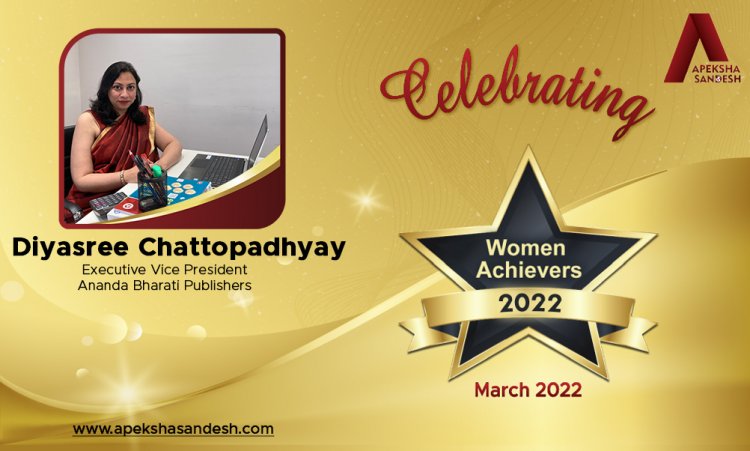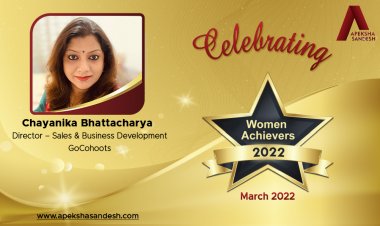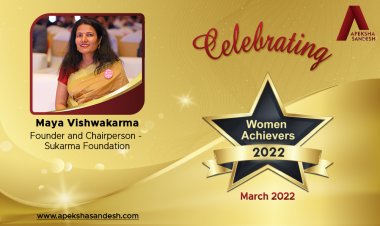Digitalization allows us to offer new ways of learning to students and opens new distribution channels - Diyasree Chattopadhyay, Executive Vice President - Ananda Bharati Publishers

Diyasree Chattopadhyay started Ananda Bharati Publishers, a business division in 2020 under the aegis of the 65-year-old renowned publishing house, Ananda Publishers. The vision was to create high quality textbooks for exam preparations at the secondary and senior secondary school levels.
As business head, Diyasree is responsible for the sales, editorial and marketing functions for this new brand which was launched in the middle of the pandemic. In the short span of two years, the books have reached over lakhs of students across the country.
We, at Apeksha Sandesh had a conversation with Diyasree Chattopadhyay, the Executive Vice President of Ananda Bharati Publishers about the schoolbooks publishing, the challenges and future of the industry. Check out the excerpts of a conversation!
What is the biggest challenge you have faced in your career so far, due to being a woman?
I started travelling at a very young age, and I have been to all but two states in India, meeting educators, school leaders and book sellers, not to mention authors, printers, and business partners. Whenever I travel, my family worries about my safety. When I travel alone, a little extra planning goes into security precautions and there are places I would not go to alone or late in the evening that my male colleagues would not even think about. That lack of freedom has been my biggest challenge, not just my own freedom to travel, but my family’s freedom from worrying.
In your opinion, what is the future of women in the field of writing and publishing?
I think the future of women is very bright in the field of writing and publishing, not just in traditionally egalitarian spaces like editorial teams, but even when it comes to running business or being in sales. I personally think it has to do with the fact that everyone in this field spends a lifetime being around books, whether they are reading them or selling them, and that makes all the difference. A book is a mirror and a lamp (to echo a very famous literary critic), and it perforce opens the mind.
What are the challenges of educational books publishers?
The pandemic introduced challenges that no one could have anticipated. Books were not considered an essential commodity in the first lockdown of 2020, and the complete closure of bookshops at the start of the academic year caused an economic setback that most publishers and distributors are still struggling to recover from two years later. But even before that, private publishers were being vilified by the media for the high price of books, with everyone ignoring the simple fact that in India, textbooks are cheaper than in any other part of the world. Private publishers don’t get subsidies on paper, and invest heavily on developing high-quality content, but they are held to task for prices that are less than that of a medium-sized pizza. Just to add perspective, an average student spends $1000 every year on textbooks in the U.S. I spend less than one-tenth of that to buy books for my two school-going kids every year. Piracy and the willful ignorance of intellectual copyright is another challenge that publishers have faced for decades. With the coming of age of the internet, things have become a lot worse.
How has digitalization affected your business sector? How do you cope with it?
Digitalization has been a boon and a bane. On the one hand, e-commerce platforms and an increase in digital access have made things more exciting for us. Private publishers have been offering high quality digital content in the form of videos, animations, simulations and interactions for quite some time. It is now possible to give QR codes, as we do for nearly every topic in a textbook, which the students can scan to access a video of a teacher explaining the topic using examples from the very book they are holding. We have an app for Ananda Bharati on Play Store and App store where we offer eBooks at 50% of the price of a print book, and we find that a lot of students these days are opting for eBooks. So, digitalization allows us to offer new ways of learning to students, and opens new distribution channels, but it has two major problems. One is rampant piracy. The other is the absence of quality control in most newcomers to the field of education. Print publishers invest a lot of time and effort in perfecting a book before it goes to print, and there are multiple rounds of corrections by authors, editors and peer reviewers. I am naturally skeptical of anything that gets uploaded in a hurry and a lot of Ed Tech companies seem to be in a great hurry to get content out there.
What is your opinion on (gender) equality? How important the issue is in the current times?
I have an opinion on gender inequality. I think it should not exist. But, regrettably, it does. We ask women about their husbands and children first, and we talk to men about their work. We say women will need time to take care of household chores, but men can work 24/7. This is unfair on both, I think. There is no reason why men should not need work-life balance and time for the family. And there is really no reason to think that all women will choose a baby over a career. My personal experience at work has always been that you have to treat people as individuals with their own characteristics and not stigmatize them or stereotype them on the basis of gender (or anything else really). I will continue to think the issue of gender inequality is important as long as I hear discussions on men and women being judged on the basis of their gender.
What main change would you like to see for young girls in the next generation?
The ability to speak without prefacing everything with ‘sorry’ or ‘excuse me’. I know men who start their sentences thus, and the degree of sarcasm that they imbue into a single word or phrase is phenomenal. Too many women just sound apologetic when they are trying to express an opinion.
What is your favorite thing about being a woman?
The ability to empathize with other women. I cannot think of any quality I have as a woman that some man or the other of my acquaintance does not have. But even the most sensitive and sympathetic man does not go through the same experiences as anyone who identifies as a woman. And while we all have different lives and some of us are more privileged (or less), in some way or another, there is a common tune in the lives of all women. Here, I will borrow the words of Maya Angelou to express it. I think women everywhere sing with “a fearful trill/of things unknown/but longed for still.”
What is the driving force behind everything you do? What keeps you motivated and driven on an everyday basis?
For as long as I can remember, my driving force has been the need to do what is right. It comes from a couple of lessons that my parents instilled very deeply. One, a belief in karma that basically translates into a need to work very hard without thinking of results. The other, loving whatever you do with a passion that transcends everything. If I look at my life right now, what keeps me motivated every day would be the people who love me, starting with the awesome twosome, my two very young children, who are perfect examples of those very two lessons that I started with.
Do you think Women’s Day should be celebrated? Why?
I think Women’s Day should be celebrated for the same reason and in the same spirit that we celebrate Independence Day. It is an event that is rooted in history, a history of terrible struggle and gross inequality. We should celebrate vehemently the fact that there were women who sacrificed a great deal to win every privilege that many women today enjoy. From the right to vote to the right to education and the right to own property, these are all hard-won rights that we must not give up, any more than we would give up our right to freedom of thought, speech or action in an independent democracy. And at the same time, we have to remember that those of us who have this freedom and these rights speak for many women who even today do not have the right to their own body or mind.
I think men and women should celebrate each other and respect each other every day, and not just one day of the year, so I have never thought of Women’s Day in the same way as commercial advertisements do. I am happy for people who choose to celebrate this day with flowers and cards, but I do get a little annoyed when people get carried away with the compliments and forget to talk about gender parity and inclusiveness. For me, Women’s Day is about achieving equality and even when (if ever) the day comes that there is a perfectly equal, inclusive world, we should still celebrate it to remind ourselves of what we have gained!
Apeksha Sandesh congratulates Diyasree Chattopadhyay for her contribution and commitment towards the field of education and publishing. We wish her good luck for the future endeavours!














































